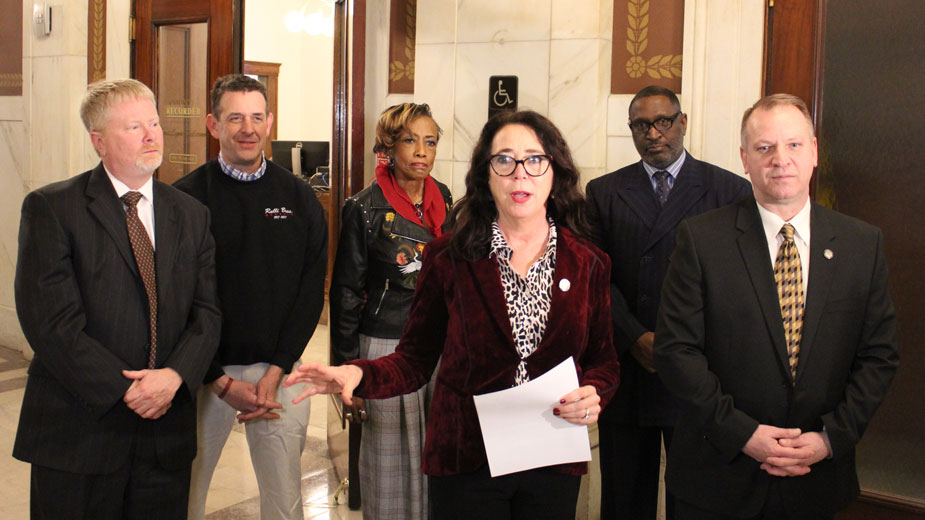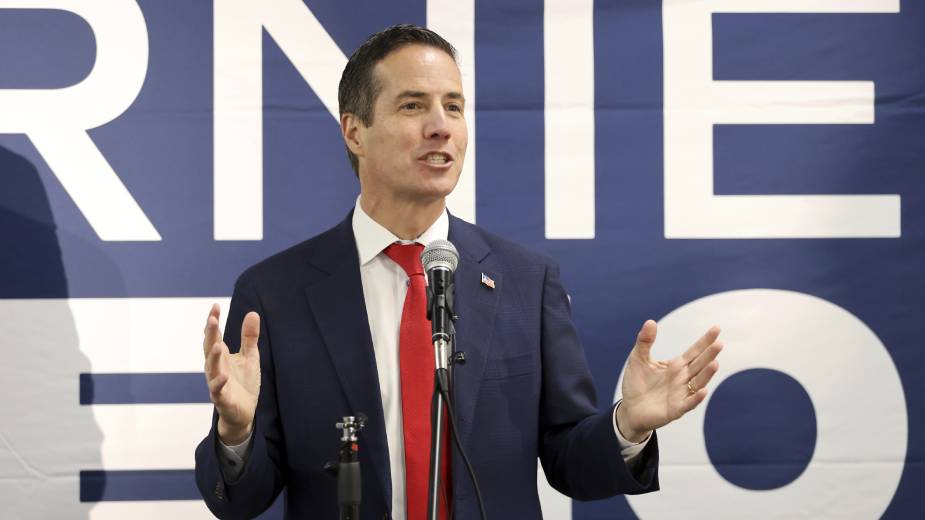Lawmakers Join on Bill to Curb Land Contracts
YOUNGSTOWN, Ohio – New state legislation to be introduced by local lawmakers seeks to curb the impact and close loopholes for companies offering land installment contracts as a route to homeownership.
In a press conference Mondayat the Mahoning County Courthouse, state Reps. Michele Lepore-Hagan and Don Manning and state Sens. Michael Rulli and Sean O’Brien announced their bipartisan, bicameral effort.
“You have to make sure the seller brings the house up to code, has an appraisal, records the contract with the county record and protects consumers,” said Lepore-Hagan, who last year introduced a bill by herself that was effectively the same measure. “The big difference is in the people who are introducing it. Now it’s a bipartisan joint effort. … The basic elements to the bill from the last General Assembly have to stay the same.”
In the wake of the Great Recession, as houses throughout the state were foreclosed, buyers – many from out of state – swooped in and bought them up. Under land contracts, frequently known as “rent to own” or “lease to own” deals, the companies require buyers to take out high interest, long-term loans to purchase the house.
The buyers are then required to pay for maintenance of the house, as well as any back taxes on the property. Eviction is common, the lawmakers said, when buyers miss a single payment. Unlike loans through traditional means, such as with a mortgage company or bank, there is no required grace period to make up missed payments and no eviction process aside from summoning the county sheriff.
“This will bring them more in line with what banks and credit unions have to do,” said Manning, R-57 New Middletown. “It makes things a little more stable so that when they do get into that contract, they know they aren’t going to be thrown out if they miss a payment or they fall behind because they get laid off.”
The legislation, named the Fair Lending Through Land Contracts Act, would require such lenders to have all properties on file with the county recorder office, which would provide tenants with some course of action if the owner breaches the contract.
“Right now, there’s no registration, so there’s no way for anyone to know about it,” said O’Brien, D-32 Bazetta. “Before they even sign a contract, they’re going to be able to see that they have the proper procedures done. It’ll be registered with the local [county recorder].”
The companion bill will be introduced in both the Ohio Senate and House of Representatives in the coming weeks, he continued, and will be refined as they pass through committees.
“Once we get into committee, we’re going to be addressing some issues that maybe weren’t addressed at the genesis of what we have. We’re going to see if we can sharpen the pencils a little bit and address very specific situations,” said Rulli, R-33 Salem. “Right now, there’s no legal recourse for these people. That’s where we’re going to start.”
According to a report from Policy Matters Ohio published last summer, Trumbull County has the most land installment contracts of any county in Ohio – 2,706 as of July 2018 – while Mahoning County had 1,622 and Columbiana County had 796.
“I got to thinking about when I got my first house and how exciting it was and how anxious you are. It’s the American dream, to own your own home,” Rulli said. “There are predators from outside Ohio who are totally abusing, manipulating and really breaking the dreams of our people. We can’t put up with it.”
Across the state, municipalities have taken up the issue of putting regulations on those offering land contracts. Already, Toledo and Cincinnati have passed laws, while Youngstown City Council will vote Wednesday night on such legislation.
“Local elected officials have been taking care of it as much as they can within their borders, but this is the first time we’re trying to do something statewide,” Lepore-Hagan said.
The use of land contracts has enriched businesses engaging in the practice, which largely targets poor and minority communities. By buying houses at a few thousand dollars and requiring tenants to assume full responsibility for the house, many buildings are flipped and then sold for tens of thousands of dollars.
“We’ve found a lot of instances where people enter into a contract, put $5,000 or $10,000 down and then are charged with getting the house up to code, paying taxes if they’re behind and then they’re being thrown out,” Manning said. “We’ve got a couple houses that we’ve seen sold four, five, six times.”
Such practices can often leave houses in a blighted state.
In 2017, when Lepore-Hagan first announced legislation, a press conference was held in conjunction with Youngstown Neighborhood Development Corp. and Action, or Alliance for Congregational Transformation Influencing our Neighborhoods. The site was a dilapidated house with a sign on the front door advertising that it had been winterized, while boards had been placed over first-floor windows, the front porch caved in and a tree grew through the roof.
“They just left the home to decay in the neighborhood. All the neighbors had to deal with a home decaying next to them, a home with a tree growing through the roof. It destroys our neighborhoods,” the state representative said.
And saving such neighborhoods from predatory land contracts, the four lawmakers agree, could help rebuild communities across the state.
“Everyone should be worried about this. This is our community. We should always be worried about our friends and neighbors, no matter how they try to achieve the dream of home ownership,” Manning said. “It makes things better for everybody because if you’ve got a more stable living environment, you’ve got a more stable economy.”
Pictured: State Sens. Sean O’Brien and Michael Rulli, Rosie Taylor of Action, state Rep. Michele Lepore-Hagan, Pastor Derrick Anderson of Action and state Rep. Don Manning announce legislation to curb predatory land contracts.
Copyright 2024 The Business Journal, Youngstown, Ohio.



